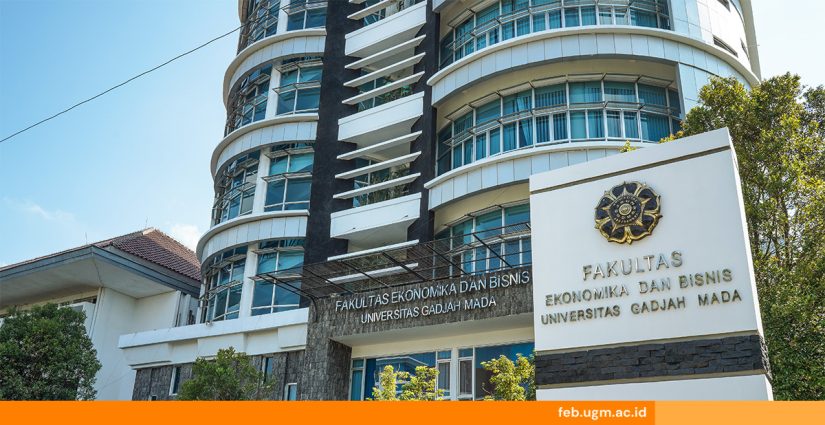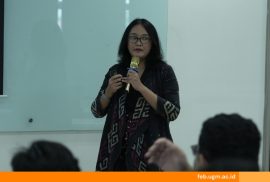
The Faculty of Economics and Business, Universitas Gadjah Mada (FEB UGM), has launched the Sustainable Business School Framework (SBSF) to promote sustainability practices in higher education, particularly in business schools. This initiative assesses business schools’ sustainability performance based on three key dimensions: teaching, research, and community engagement. The Dean of FEB UGM, Prof. Dr. Didi Achjari, S.E., M.Com officially launched the framework., Akt., during the Open Senate Meeting at the peak of FEB UGM’s 70th Anniversary on Friday, September 19, 2025.
“We are proud to introduce one of FEB UGM’s efforts to strengthen social impact in the area of sustainability,” said Prof. Didi (19/9).
Prof. Didi explained that the framework’s development stemmed from growing concerns over increasingly complex sustainability challenges in recent years. The rise of global issues such as poverty, inequality, climate change, and weak governance has created complexities that transcend national boundaries. The 2025 Sustainable Development Goals (SDGs) Report reveals that, although progress exists, the current rate of progress is insufficient to meet the 2030 targets, especially given the substantial discrepancy between commitments and actual implementation across sectors.
“This gap demands a more systematic and integrated approach. Moreover, the transition toward a sustainable economy requires a generation of professionals who understand the concepts and possess practical skills to develop strategic initiatives and innovative solutions,” he added.
Amid the challenges of accelerating progress toward sustainability goals, more institutions from various sectors have begun to realize that sustainability is key to competitiveness and resilience in the future. As centers of knowledge and innovation, higher education institutions in economics and business play a vital role in shaping future leaders who are ethical and sustainability-oriented. A crucial step in this process is building an educational ecosystem in business schools that emphasizes sustainability principles from the outset, fostering a generation of leaders ready to address global sustainability challenges.
Through the Sustainability and Strategic Initiatives Unit (SSIU), established in early 2025, FEB UGM initiated SBSF. This framework promotes sustainability practices in higher education, particularly in business schools. In line with the spirit of achieving the Sustainable Development Goals (SDGs), SBSF provides a foundation for business schools to transform into sustainable institutions that support social, economic, and environmental dimensions. It also strengthens the business school ecosystem in responding to sustainable development through the three pillars of higher education: education, research, and community engagement.
“SBSF also serves as the foundation for us in preparing sustainability initiatives guidelines and the first semester sustainability report of 2025,” he explained.
Through SBSF, FEB UGM encourages business schools to place sustainability as an essential component in economics and business education. Thus, SBSF will be a source of inspiration for business schools in Indonesia and worldwide, encouraging them to strengthen their sustainability commitments.
“We always welcome feedback from FEB UGM’s academic community, including alumni and strategic partners, to continuously improve SBSF as part of our commitment to ongoing enhancement,” he said.
Meanwhile, Head of SSIU FEB UGM, Luluk Lusiantoro, Ph.D., added in a separate session that SBSF evaluates the sustainability of business schools through three main dimensions: education, research, and community engagement. SBSF also promotes collaboration among stakeholders in business schools to integrate sustainability principles into campus life.
“The purpose of establishing SBSF is to promote sustainable practices in business schools, thereby fostering future leaders in economics and business who embrace a sustainability mindset,” she explained.
Luluk elaborated that through SBSF, business schools can obtain a comprehensive map of sustainability practices, including Environmental, Social, and Governance (ESG) aspects. They can also access a list of key performance indicators (KPIs) in education, research, and community engagement, use a framework aligned with Global Reporting Initiative (GRI) Standards and the SDGs, and build networks with other institutions that share similar visions.
Participation in SBSF is open to business schools worldwide, including those in Indonesia and ASEAN, committed to producing sustainability-minded graduates. Its implementation follows a logical model encompassing input, transformation processes, and outputs and impacts, which are then reflected in periodic sustainability reports.
With the presence of SBSF, FEB UGM reinforces its commitment to driving higher education as a key driver of sustainable development. FEB UGM invites business schools in Indonesia and across the globe to adopt SBSF as a guide in nurturing future leaders with a sustainability orientation. For more information about SBSF, please visit ssiu.feb.ugm.ac.id.
Reporter: Kurnia Ekaptiningrum
Sustainable Development Goals










